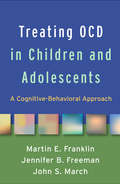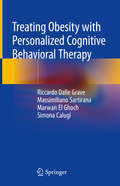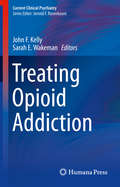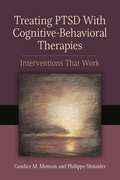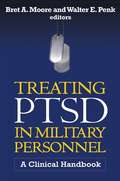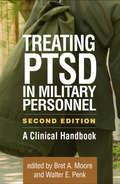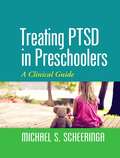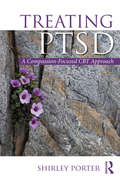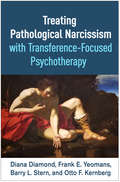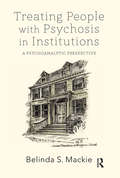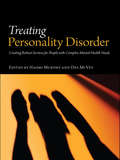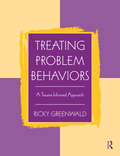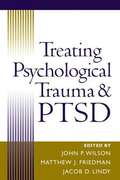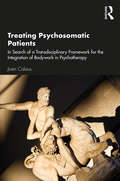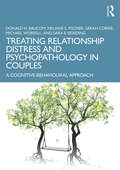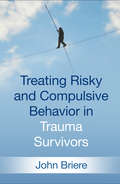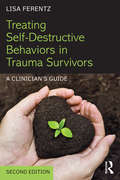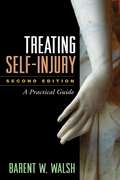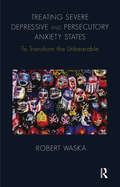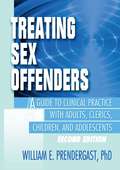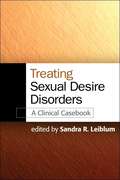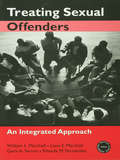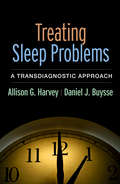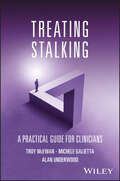- Table View
- List View
Treating OCD in Children and Adolescents: A Cognitive-Behavioral Approach
by Martin E. Franklin Jennifer B. Freeman John S. MarchFrom foremost experts, this authoritative work offers a framework for helping children overcome obsessive–compulsive disorder (OCD) using the proven techniques of cognitive-behavioral therapy (CBT). Therapists gain knowledge and tools to engage 6- to 18-year-olds and their parents and implement individualized CBT interventions, with a focus on exposure and response prevention. In a user-friendly, conversational style, the authors provide real-world clinical guidance illustrated with vivid case examples. Purchasers get access to a Web page where they can download and print the volume's reproducible handouts in a convenient 8 1/2" x 11" size. Building on the earlier OCD in Children and Adolescents: A Cognitive-Behavioral Treatment Manual (by John March and Karen Mulle), this book reflects two decades of advances in the field; most of the content is completely new.
Treating Obesity with Personalized Cognitive Behavioral Therapy
by Riccardo Dalle Grave Massimiliano Sartirana Marwan El Ghoch Simona CalugiThis book describes a novel therapy for obesity that associates the traditional procedures of weight-loss lifestyle modification with specific, individualized cognitive behavioral procedures to address some obstacles that have been indicated by recent research to influence weight loss and maintenance. The Cognitive Behavioral Therapy for Obesity (CBT-OB) can be used to treat all classes of obesity, including patients with severe comorbidities and disability associated with obesity, who are not usually included in traditional weight-loss lifestyle modification treatments. The book describes the treatment program in detail, and with numerous clinical vignettes. It also discusses involving significant others in the change process and adapting the CBT-OB for patients with severe obesity, binge-eating disorder, medical and psychiatric comorbidity, and treated with weight-loss drugs or bariatric surgery. Lastly, a chapter is dedicated to the use of digital technology with CBT-OB in order to help patients monitor their food intake and physical activity and to addressing obstacles in real time. Thanks to the description of how to apply the latest, evidence-based CBT-OB to real world settings, this volume is a valuable useful tool for all specialists - endocrinologists, nutritionists, dietitians, psychologists, psychiatrists - who deal with obesity and eating disorders.
Treating Opioid Addiction (Current Clinical Psychiatry)
by John F. Kelly Sarah E. WakemanThis book addresses opioids and opioid use disorders from epidemiological, clinical, and public health perspectives. It covers detailed information on the nature of opioids, their effects on the human body and brain, prevention, and treatment of opioid addiction. Unlike other texts, the first section of this volume builds a strong historical, neurobiological, and phenomenological foundation for a deep understanding of the topic and the patient. The second section addresses the most challenging issues clinicians face, including pharmacological and psychosocial treatments, harm reduction approaches, alternative approaches to pain management for the non-specialist, and prescribing guidelines. Treating Opioid Addiction is a valuable resource for psychiatrists, psychologists, addiction medicine physicians, primary care physicians, drug addiction counselors, students, trainees, scholars, and public health officials interested in the effects and impact of opioids in the clinical and epidemiological context.
Treating PTSD With Cognitive–Behavioral Therapies: Interventions That Work (Concise Guides on Trauma Care Series)
by Candice M. Monson Philippe ShnaiderThis compact, clinician-friendly resource walks readers through cognitive–behavioral techniques and treatment packages for clients with PTSD, using case studies to illustrate how to troubleshoot common problems. Research over the past three decades has confirmed that cognitive–behavioral therapies (CBTs) are among the most effective treatments for Posttraumatic Stress Disorder (PTSD). This book introduces clinicians to cognitive–behavioral techniques for PTSD and guides them in adopting treatment protocols. Because myths about CBT for PTSD have been barriers to use, the book offers a clear view of the facts about the evidence-based therapies that offer such promise in helping clients to heal from their traumas. The goal of this clinician-friendly book is clear: to make CBT available to suffering clients.
Treating PTSD in Military Personnel
by Bret A. Moore Walter E. PenkThis practical volume covers the full range of effective treatments for PTSD and discusses their implementation with service members and veterans. The focus is on how to meet this population's unique needs. From conducting a thorough assessment to choosing an appropriate psychosocial or pharmacological treatment, the expert editors and contributors clearly relate their years of experience in military contexts. The norms and values of military culture are discussed. Chapters thoroughly describe available therapies, review their strengths and limitations, and use illustrative case examples to demonstrate the treatments in action. Also addressed are clinical issues and co-occurring problems that can arise in this population, such as traumatic brain injury and substance abuse, and strategies for dealing with them
Treating PTSD in Military Personnel, Second Edition: A Clinical Handbook
by Bret A. Moore Walter E. Penk Matthew J. FriedmanThis state-of-the-science guide to assessing and treating posttraumatic stress disorder (PTSD) in active-duty service members and veterans has now been extensively revised with 65% new material. Leading authorities review available evidence-based treatments, including individual, group, and couple and family therapy approaches. Knowledge about military culture, the stressors experienced by service members, and common challenges for both military and civilian practitioners is woven through the volume and reflected in the vivid case examples. Chapters on specific clinical issues delve into co-occurring affective, anxiety, substance use, and sleep disorders; treatment of particular types of trauma; suicide prevention; and more. New to This Edition *Chapters on additional treatments: mindfulness-based behavioral and cognitive therapies, stress inoculation training, cognitive-behavioral conjoint therapy, group therapy, and complementary and alternative therapies. *Chapters on additional clinical issues: chronic pain, moral injury, complex traumatic stress disorders, and posttraumatic growth. *Updated throughout with the latest treatment research and DSM-5 diagnostic changes.
Treating PTSD in Preschoolers
by Michael S. ScheeringaAdapting cognitive-behavioral therapy (CBT) to meet the needs of 3- to 6-year-olds with posttraumatic stress disorder (PTSD), this book provides an evidence-based framework for assessment and treatment. Step-by-step instructions are provided for conducting graduated exposure in a safe, developmentally appropriate fashion. Case examples and sample dialogues illustrate how to implement each component of therapy, engage both children and parents, and motivate them to complete treatment successfully. The treatment is suitable for children exposed to any type of trauma. In a large-size format for easy photocopying, the book contains dozens of reproducible handouts and forms. Purchasers get access to a Web page where they can download and print the reproducible materials.
Treating PTSD: A Compassion-Focused CBT Approach
by Shirley PorterTreating PTSD presents a comprehensive, compassion-focused cognitive behavioral therapy (CBT) approach that provides therapists with the evidence-based information they need to understand trauma’s effects on the mind and body as well as the phases of healing. Chapters offer discussion, practical tools, and interventions that therapists can use with clients suffering from post-traumatic stress disorder (PTSD) to reduce feelings of distress and increase their sense of safety. Readers are introduced to the metaphor of "the valley of the shadow of death" to explain the experience of PTSD; they’re also shown how to identify the work they’ll need to do as therapists to accompany clients on their healing journey. Two new compassion-focused CBT interventions for trauma processing are also introduced.
Treating Pathological Narcissism with Transference-Focused Psychotherapy (Psychoanalysis and Psychological Science)
by Diana Diamond Otto F. Kernberg Frank E. Yeomans Barry L. SternFilling a crucial gap in the clinical literature, this book provides a contemporary view of pathological narcissism and presents an innovative treatment approach. The preeminent authors explore the special challenges of treating patients--with narcissistic traits or narcissistic personality disorder--who retreat from reality into narcissistic grandiosity, thereby compromising their lives and relationships. Assessment procedures and therapeutic strategies have been adapted from transference-focused psychotherapy (TFP), a manualized, evidence-based treatment for borderline personality disorder. Rich case material illustrates how TFP-N enables the clinician to engage patients more deeply in therapy and help them overcome relationship and behavioral problems at different levels of severity. The volume integrates psychodynamic theory and research with findings from social cognition, attachment, and neurobiology.
Treating People with Psychosis in Institutions: A Psychoanalytic Perspective
by Belinda S. MackieThis book brings together the histories of a number of psychoanalytically-informed hospitals, and provides a synthesis of the theoretical underpinnings in the institutional practice of each. Of particular interest is how psychoanalysts and psychoanalytically-trained staff working in institutions apply their theoretical understanding, and in what ways the psychoanalytic technique has been modified or adapted to the treatment of individual patients with psychosis and to the workings of an institution in general. Here the institution is the subject of the case study. Institutions that are theoretically orientated to psychoanalysis were chosen and examined, taking into account their various approaches to the treatment. A number of institutional models that are informed by psychoanalysis offer a guide to the treatment and present a version of institutional practice that is different from the prevailing models in psychiatry. This has implications for health services in the current climate of mental health reform.
Treating Personality Disorder: Creating Robust Services for People with Complex Mental Health Needs
by Naomi MurphyThis book considers personality disorders and how they are treated within the institutional context of prisons and hospitals and offers practical guidance on assessment, formulation and integrated treatment planning. Treating Personality Disorder offers contributions from professionals in psychiatry, nursing and psychology as well as prison officers and service managers and areas of discussion include: delivering integrated treatment to people with personality disorders issues and challenges for the clinical professional the role of the psychiatrist in treating personality disorder Treating Personality Disorder will provide a timely and valuable guide for all professionals involved in the treatment and management of serious personality disorders within an institutional framework.
Treating Problem Behaviors: A Trauma-Informed Approach
by Ricky GreenwaldThe book is designed as a user-friendly textbook/manual for mental health professionals. It teaches a trauma-informed treatment approach as an organizing framework for a series of empirically supported interventions including motivational interviewing, cognitive-behavioral skills training, trauma resolution, and relapse prevention. Although it notes the importance of a systemic treatment approach, the focus is on the individual component of treatment.
Treating Psychological Trauma and PTSD
by John WilsonMuch has been learned about PTSD in the past two decades, yet many questions remain about the complex pathways by which trauma disrupts people's lives. This authoritative volume presents an innovative psychobiological framework to help clinicians and researchers better understand the myriad difficulties facing patients and navigate the array of available intervention approaches. Incorporating the latest theory and clinical research, the book provides a crucial reformulation of diagnostic criteria and treatment goals. It then brings together leading treatment experts to describe and illustrate their respective approaches, facilitating the selection and implementation of the most effective interventions for individual patients. The book first delineates a holistic, organismic model of PTSD. Particular attention is given to how the concept of allostatic load has enabled contemporary investigators to gain a more dynamic view of human stress responses and how they may go awry. Aided by clearly presented tables and charts, the volume elucidates the process by which traumatic experiences can give rise to 65 symptoms contained within five symptom clusters. Augmenting the traditional domains of PTSD symptomatology physiological disturbances, traumatic memory, and avoidance are two additional clusters dealing with frequently encountered problems with self and identity and with attachment, intimacy, and personal relationships. Contributors then provide detailed presentations of core therapeutic approaches acute posttraumatic interventions, cognitive-behavioral approaches, pharmacotherapy, group psychotherapy, and psychodynamic techniques, as well as approaches for special populations. The concluding section reviews and synthesizes all case material presented, examining which symptoms are addressed by each modality, which treatment objectives are met, and which clients are likely to be helped.
Treating Psychosomatic Patients: In Search of a Transdisciplinary Framework for the Integration of Bodywork in Psychotherapy
by Joeri CalsiusTreating Psychosomatic Patients: In Search of a Transdisciplinary Framework for the Integration of Bodywork in Psychotherapy offers a conceptual and therapeutic framework for all therapists who have to deal with the psychosomatic ‘conflicted’ body, as presented in anxiety and depression, stress and burn-out, medically unexplained symptoms and trauma. The book introduces the transdisciplinary framework 'experiential bodywork' (EBW), drawing on theories and scientific findings drawn from clinical psychology, philosophy, neuroscience, psychotherapy and myofascial therapy. EBW provides a roadmap for a better understanding of the processes that underpin body psychotherapy and body-mind therapies. On a practical level, EBW challenges the therapist to marry the power of psychotherapeutic techniques with the richness of hands-on bodywork and hands-off movement expression. With the 'armoured' body as an entry point, patients learn to feel their body from within and listen to what it tells them. In the sharpness of this awareness they discover a freer way of speaking, moving and being present in the world. Through EBW, Treating Psychosomatic Patients offers a transdisciplinary, scientifically based framework for the integration of bodywork in psychotherapy, ranging from psychosomatics to trauma, and will be of great interest to psychologists, psychotherapists and counsellors in a variety of settings. EBW also helps somatic therapists, such as physical therapists or osteopaths, to better understand the richness and layeredness of deep bodywork from different psychological, developmental and 'embodied' perspectives.
Treating Relationship Distress and Psychopathology in Couples: A Cognitive-Behavioural Approach
by Sarah Corrie Michael Worrell Donald H. Baucom Melanie S. Fischer Sara E. BoedingClose relationships and mental health are two key ingredients to living a meaningful, fulfilled life. These two domains are the central focus of Treating Relationship Distress and Psychopathology in Couples: A Cognitive-Behavioural Approach. As expert clinicians, trainers, and researchers in the field of cognitive-behavioural couple therapy and couple-based interventions for psychopathology, the authors offer a highly accessible volume for experienced clinicians and trainees alike. This book details the most recent innovations in CBCT, a principle-based, flexible treatment approach for couples with a wide range of relationship concerns, circumstances, and stages of life. Based on a clear conceptual framework, readers learn how to address individual and couple functioning in an integrated, comprehensive manner and how to apply principle-based interventions that directly flow from this framework. Treating Relationship Distress and Psychopathology in Couples was written by a team of five authors, born in four different countries and working together as a team for a number of years, providing a cohesive framework based on work in a variety of contexts. While staying close to research findings that inform treatment, they provide a text for clinicians at all levels of training and experience in working with couples.
Treating Risky and Compulsive Behavior in Trauma Survivors
by John BriereFrom leading authority John Briere, this book provides a comprehensive treatment approach for survivors of childhood trauma who numb or avoid emotional distress by engaging in substance abuse, risky sexual activities, self-injury, suicidality, bingeing and purging, or other self-harming behaviors. Briere shows how to help clients identify and manage the triggers of these "distress reduction behaviors," learn to regulate intrusive emotional states, and safely process trauma- and attachment-related memories. Emphasizing the therapeutic relationship, Briere's approach draws on elements of psychodynamic, interpersonal, and cognitive-behavioral therapy; mindfulness training; and dialectical behavior therapy. The book combines cutting-edge clinical and experimental research with clearly described interventions, case examples, and reproducible handouts and forms. Purchasers get access to a Web page where they can download and print the reproducible materials in a convenient 8 1/2" x 11" size.
Treating Self-Destructive Behaviors in Trauma Survivors: A Clinician’s Guide
by Lisa FerentzTreating Self-Destructive Behaviors in Trauma Survivors, 2nd ed, is a book for clinicians who specialize in helping trauma survivors and, during the course of treatment, find themselves unexpectedly confronted with client disclosures of self-destructive behaviors, including self-mutilation and other manifestations of deliberately "hurting the body" such as bingeing, purging, starving, substance abuse and other addictive behaviors. Arguing that standard safety contracts are not effective, renowned clinician Lisa Ferentz introduces viable treatment alternatives, assessment tools, and new ways of understanding self-destructive behavior using a strengths-based approach that distinguishes between the "experimental" non-suicidal self-injury (NSSI) that some teenagers occasionally engage in and the self-destructive behaviors that are repetitive and chronic. In the new edition, many of the treatment strategies are cross referenced to a useful workbook, giving therapists and clients concrete ways to integrate theory into practice. In addition, Ferentz emphasizes the importance of assessing for and strengthening clients' self-compassion, and explains how nurturing this idea cognitively, emotionally, and somatically can become the catalyst for motivation and change. The book also explores a cycle of behavior that clinicians can personalize and use as a template for treatment. In its final sections, the book focuses on counter-transferential responses and the different ways in which therapists can work with self-destructive behaviors and avoid vicarious traumatization by adopting tools and strategies for self-care. Treating Self-Destructive Behaviors in Trauma Survivors, 2nd ed, can be used on its own or in conjunction with the accompanying client-focused workbook, Letting Go of Self-Destructive Behaviors: A Workbook of Hope and Healing.
Treating Self-Injury, Second Edition
by Barent W. WalshThis trusted practitioner resource is acclaimed for its clear, compassionate, and hopeful approach to working with clients who self-injure. Barent Walsh provides current, evidence-based knowledge about the variety and causes of self-injurious behavior, its relationship to suicidality, and how to assess and treat it effectively. Illustrated with detailed case examples, chapters review a wide range of cognitive-behavioral interventions. Essential guidance is provided on tailoring the intensity of intervention to each client's unique needs. Walsh is joined by several colleagues who have contributed chapters in their respective areas of expertise. Reproducible assessment tools and handouts can be downloaded and printed in a convenient 8 1/2" x 11" size. New to This Edition Incorporates up-to-date research and clinical advances. Now uses a stepped-care framework to match interventions to client needs. Chapters on the relationship between suicide and self-injury, formal assessment, family therapy, and residential treatment for adolescents. Special-topic chapters on "the choking game," foreign body ingestion, multiple self-harm behaviors, and self-injury in correctional settings.
Treating Severe Depressive and Persecutory Anxiety States: To Transform the Unbearable
by Robert WaskaThis book serves two purposes. First, it provides the psychoanalyst or psychotherapist with a more flexible method of practicing psychoanalysis. This is the clinical approach of "analytic contact", a technical stance in which more patients can be reached in a deeper and more helpful manner. Analytic contact is an operationally robust Kleinian approach for the real world of private practice and targets the combination of internal and external factors there are consistently at play with all patients.The second aim of this book is to examine specific groups of patients that present unique challenges to the psychoanalyst. These populations are examined and new and creative ways of working with them are introduced. The author invites the reader to discover the clinical value and technical utility of analytic contact.
Treating Sex Offenders
by Judith V. Becker Jill D. StinsonThis structured yet flexible manual presents an innovative group treatment approach that targets deficits in self-regulation, a central problem for sex offenders. Safe Offender Strategies (SOS) comprises 10 evidence-based modules that teach participants the skills to desist from problem behaviors, manage their emotions and impulses, and break unhealthy relationship patterns. Motivational enhancement and validation techniques are woven throughout this collaborative treatment. SOS can be used with a range of clients including high-risk offenders and those with mental illness or intellectual disabilities in institutional or outpatient settings. Fifteen reproducible forms and worksheets can be downloaded and printed in a convenient 8 1/2" x 11" size.
Treating Sex Offenders: A Guide to Clinical Practice with Adults, Clerics, Children, and Adolescents, Second Edition
by Letitia C Pallone William E PrendergastGain important new insights into religious personnel who molest children! Treating Sex Offenders: A Guide to Clinical Practice with Adults, Clerics, Children, and Adolescents, Second Edition updates the groundbreaking original with new material that integrates adolescent and adult sex offenders, emphasizing similarities and differences in personality type, behavior, and treatment. Author William Prendergast draws on four decades' experience in working in the diagnosis and treatment of habitual sex offenders to present a straightforward look at what makes them tick. This vital new edition includes appropriate additions and changes to treatment techniques, progress reports on case study subjects, reader feedback on the original book, and perhaps most important, new information on religious personnel who molest children. Treating Sex Offenders provides training in clear language for those working with sexual offenders and explanations in simple terms for those suffering as a result of their actions. The book parallels workshops and courses conducted by the author, detailing how to identify major characteristics and traits of offenders, different types of offenders, child and adolescent offenders, how to recognize warning signs of deviant behavior, and how to apply specific treatment techniques that really work. Individual aspects of the makeup and treatment of the compulsive adult and adolescent sex offender are addressed through factors, traits, treatment, and candid cases studies. Treating Sex Offenders addresses the most vital issues involving sexual pathology, including: inadequate personality theory sexual performance problems imprinting self-confrontation sex as the chosen deviation the five c's of sex offender treatment and much more! Treating Sex Offenders: A Guide to Clinical Practice with Adults, Clerics, Children, and Adolescents, Second Edition is an essential resource for psychiatrists, psychologists, social workers, counselors, and those in the criminal justice field who deal with sex offenders on a daily basis. Family members involved in the lives of sex offenders and survivors of sexual abuse or assault will find the case studies enlightening in making sense of a tragic situation.
Treating Sexual Desire Disorders
by Sandra LeiblumThe loss or lack of interest in sex is a common complaint in sex therapy. Organized around in-depth case presentations, this book showcases effective treatment approaches for individuals and couples. The contributors are highly skilled therapists who explore the complexity of sexual desire problems and offer detailed descriptions of clinical techniques. The book illuminates the complex interplay of biological, psychological, interpersonal, contextual, and cultural factors that need to be considered in assessment and intervention. Concise chapter introductions by editor Sandra R. Leiblum summarize key themes and provide a context for understanding each author's approach.
Treating Sexual Offenders: An Integrated Approach (Practical Clinical Guidebooks)
by William L. Marshall Liam E. Marshall Geris A. Serran Yolanda M. FernandezThrough extensive consideration of current research, theory and practice, Treating Sexual Offenders provides a guide to the assessment, treatment, and evaluation of a number of different disorders. Provides therapists with the means to have a continued positive impact on the sex offender, from assessment to post-treatment evaluation and follow-up. Includes fetishisms, transvestic fetishisms, exhibitionism, frottage, pedophilia, sexual sadism, sexual masochism, telephone scatologia, voyeurism, rape, child molestation, and incest. The Therapist Rating Scale used and referenced throughout the text is available for download below.Therapist Rating Scale (pdf file)
Treating Sleep Problems: A Transdiagnostic Approach
by Allison G. Harvey Daniel J. BuysseThis practical manual presents an innovative modular treatment for adults and adolescents with a wide range of sleep and circadian rhythm problems, such as insomnia, daytime sleepiness, poor sleep quality, and irregular sleep-wake schedules. The treatment applies broadly to all individuals with sleep problems, including those with psychiatric disorders. It is grounded in a cutting-edge understanding of sleep health and integrates elements of cognitive-behavioral therapy for insomnia (CBT-I), interpersonal and social rhythm therapy (IPSRT), and other evidence-based therapies. Each module is described in detail, including specific practitioner guidance, sample scripts, developmental adaptations, and tips for enhancing motivation. Purchasers get access to a Web page where they can download and print the book's 17 reproducible client handouts in a convenient 8 1/2" x 11" size.
Treating Stalking: A Practical Guide for Clinicians
by Troy McEwan Michele Galietta Alan UnderwoodTREATING STALKING Understand and address the drivers of stalking behaviour with this vital guide In the thirty-five years since stalking was identified as harmful behaviour, addressing its social effects has largely fallen to criminal justice systems. There is, however, significant evidence to suggest that pure criminalisation has limited meaningful impact. Mental health and other interventions for people who stalk may be the only serious path to relief for many stalking victims. Despite this, robust research into treatment for people who stalk remains rare, and relevant resources for treatment providers few. Treating Stalking is the first comprehensive guide for clinicians on this vital subject. It outlines 10 principles of effective intervention and gives detailed, practical, advice about delivering psychological and other treatment. It’s content draws on decades of research and clinical experience, but Treating Stalking also proposes a stalking research agenda to help ensure that future practice is evidence-based. Treating Stalking readers will also find: Case examples and worksheets from the authors’ psychological practice Detailed advice on assessment, risk assessment, case formulation, and ethical and legal issues Discussion of multidisciplinary and multiagency management to help stop stalking Treating Stalking is a must-have for any psychologist or other mental health professional looking to treat patients who stalk.
